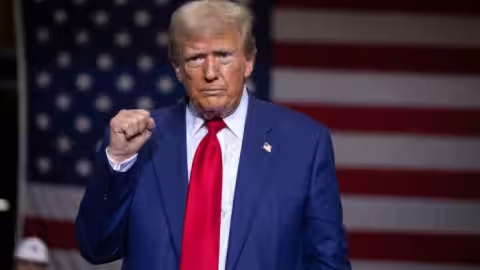Good morning. Here’s a dark tale to start the week: Russia’s FSB spy service is systematically grooming Ukrainian teenagers, orphans and young adults to spy against their country, a Financial Times investigation has found, handing out cash to kids who take photos of military sites, scope out targets or even plant homemade bombs.
Today, our trade and tech correspondents report on European lawmakers wading into the US trade talks with a pre-emptive warning to negotiators not to offer any leeway on digital rules on US big tech companies. And our finance correspondent brings us an update from the increasingly one-sided Eurogroup leadership race.
Parliamentary oversight
As a deadline to seal a trade deal with the US draws nearer, the European Commission is finding its room for manoeuvre limited not just by US President Donald Trump’s hardline approach but also by EU lawmakers, write Andy Bounds and Barbara Moens.
Contest: To avoid Trumps’ threat of 50 per cent “reciprocal tariffs” across the board, Brussels is offering unspecified concessions on “non-tariff barriers”, EU rules and regulations which the US believes hurt its companies and block imports. Trump has delayed the tariffs until July 9 while the two sides negotiate a deal.
Members of the European parliament, who would have to approve any changes in legislation as well as the final trade deal, are starting to agitate about what the commission might be tempted to offer behind closed doors. A key concern is the enforcement of the Digital Markets Act, the EU’s landmark new digital rules, which is a major flashpoint for Trump.
European Commission president Ursula von der Leyen has made clear that formal changes to the EU’s digital rule book are off the table. But the bloc has some leeway in how far it goes in enforcing the rules, for example when it comes to the amount of the fines for tech companies.
Matthias Jorgensen, a senior trade official in the commission, told a parliamentary committee last week that rule changes were a red line but it would look at how US companies “can comply with our legislation in an easier way”.
Commission executive vice-president Teresa Ribera, who oversees the DMA, has been increasingly vocal in recent weeks that it must not be used as leverage in the trade talks, implying that she fears some inside the EU’s executive think otherwise.
Now, European lawmakers are also urging the commission not to cave in on its enforcement of the digital rules. Twenty-three MEPs sent questions to the commission, warning that concessions on the DMA “would set a dangerous precedent for external interference in EU legislation”, and asking the commission to commit to properly enforcing it without exceptions for US companies.
The lawmakers also include two from von der Leyen’s own group, the European People’s Party.
European parliament president Roberta Metsola reminded leaders at an EU summit last week that the parliament is key for signing off on any upcoming trade deal.
“Parliament will have a choice with a final vote in plenary,” Metsola said.
Chart du jour: Safe haven
Europe’s tourist hotspots are bracing for a record number of visitors this summer as holidaymakers spurn the US and the Middle East.
Euro race
The election of the next president of the Eurogroup in one week seems a foregone affair. But that hasn’t stopped candidates from throwing their hat into the ring, writes Paola Tamma.
Context: The head of the Eurogroup, the council of finance ministers from the 20 Eurozone countries, is elected by a simple majority. The vote is set to take place next Monday.
The incumbent Paschal Donohoe, Ireland’s finance minister, is likely to return for a third two-and-a-half-year term, keeping the conservatives at the helm of yet another top EU job.
But two of Donohoe’s peers entered the arena on Friday: Carlos Cuerpo of Spain, and Lithuania’s Rimantas Šadžius, both of the Socialists and Democrats (S&D) group.
Cuerpo’s bid was made literally at the last minute: his candidature was sent at one minute before midday on Friday, which was the deadline. Spain’s Prime Minister Pedro Sánchez pushed his candidate at last week’s leaders’ summit.
“It is time for the euro area to seize this opportunity to regain our leadership on the global stage,” Cuerpo said in a statement.
But both he and Šadžius are unlikely to win, as the majority of Eurogroup members are representatives of conservative parties, and the S&D will have to split their already meagre vote between two candidates.
However, the finance ministers of the three largest EU economies are not conservatives: Germany’s belongs to the S&D, France’s to the liberal Renew, and Italy’s is a part of the nationalist rightwing Patriots for Europe grouping.
It is for their votes that candidates are vying.
Spokespeople for the finance ministries of France, Germany and Italy declined to comment.
What to watch today
-
EU Council president António Costa and European Commission president Ursula von der Leyen attend UN conference on financing for development in Seville.
-
EU chief diplomat Kaja Kallas visits Armenia.
Now read these
-
Rare earths: France is emerging as a critical domestic player in the European rare earths market, seeking to exploit China’s move to drastically reduce exports.
-
‘Overflowing’: Europe’s most important ports are running at maximum capacity as Trump tariffs and low river levels cause huge goods congestion.
-
Proud: Hundreds of thousands of people defied Hungarian Prime Minister Viktor Orbán’s ban and marched at Budapest’s largest ever Pride.
Are you enjoying Europe Express? Sign up here to have it delivered straight to your inbox every workday at 7am CET and on Saturdays at noon CET. Do tell us what you think, we love to hear from you: europe.express@ft.com. Keep up with the latest European stories @FT Europe
























